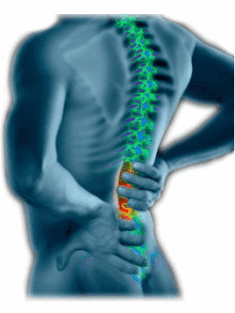What to Expect
Your first visit - It's all about you at your first visit to the Wye Valley Chiropractic Clinic!

You'll be asked to complete a short New Patient form with your name and contact details, the details of your GP, your general medical history, and any medications that you might be taking. We'll then spend time to get down all the details about your main problem, how it affects you and what it prevents you from doing. We'll go through the details of your lifestyle, occupational strains and stresses - just to make sure that there is nothing else going on - before carrying out a physical examination.
After this, we'll explain the probable diagnosis and can decide on an appropriate treatment plan that is right for your particular problem. We usually commence treatment at this first visit as we realise that patients usually want to get going on the road to recovery, freeing themselves from pain and discomfort, as soon as possible. However, if you decide that chiropractic isn't the right sort of treatment for you, then that's ok too!
Case History - You will be asked a lot of questions, not just about your current problem, but about your past medical history. Some of the questions we ask may seem irrelevant, but they are very important as they allow us to establish an overall picture of your health, and you as a person, and determine whether chiropractic care is appropriate for your condition.
Physical Examination - After taking the history, we'll have a look at what's going on. The physical examination will focus on your joints, muscles and nerves - how they move and function - and will include a postural assessment, and a range of orthopaedic, neurological and chiropractic tests. Sometimes a thorough check-up of your heart, lungs and abdomen is performed to rule out any other causes of your problem. At this stage, you may be offered treatment immediately, but sometimes it is necessary to delay things for a few days whilst we obtain further information from your GP (e.g. blood test results, X-ray reports) or refer you for MRI scans or X-rays.
Report of Findings – before starting treatment we will explain what we have found, what is wrong with you and what we plan to do about it! You will be advised of any exercises, dietary or lifestyle changes that might help your recovery. We’ll explain how long it is likely to take for you to recover, how many treatments you are likely to need, and the cost of this care.
After this, we'll explain the probable diagnosis and can decide on an appropriate treatment plan that is right for your particular problem. We usually commence treatment at this first visit as we realise that patients usually want to get going on the road to recovery, freeing themselves from pain and discomfort, as soon as possible. However, if you decide that chiropractic isn't the right sort of treatment for you, then that's ok too!
Case History - You will be asked a lot of questions, not just about your current problem, but about your past medical history. Some of the questions we ask may seem irrelevant, but they are very important as they allow us to establish an overall picture of your health, and you as a person, and determine whether chiropractic care is appropriate for your condition.
Physical Examination - After taking the history, we'll have a look at what's going on. The physical examination will focus on your joints, muscles and nerves - how they move and function - and will include a postural assessment, and a range of orthopaedic, neurological and chiropractic tests. Sometimes a thorough check-up of your heart, lungs and abdomen is performed to rule out any other causes of your problem. At this stage, you may be offered treatment immediately, but sometimes it is necessary to delay things for a few days whilst we obtain further information from your GP (e.g. blood test results, X-ray reports) or refer you for MRI scans or X-rays.
Report of Findings – before starting treatment we will explain what we have found, what is wrong with you and what we plan to do about it! You will be advised of any exercises, dietary or lifestyle changes that might help your recovery. We’ll explain how long it is likely to take for you to recover, how many treatments you are likely to need, and the cost of this care.

Treatment - Chiropractors use a number of techniques to free up the joints and loosen up the soft tissues in the body. These techniques include joint manipulation, soft tissue work, massage, trigger point work, mobilisation, stretching and sometimes myofascial dry needling or medical acupuncture. Chiropractors are trained to perform specific adjustments to free up joints in the spine, or elsewhere in the body that are not moving properly – a bit like a door that has got stuck on its hinges! In the spine, these restricted joints can irritate the delicate nerve tissue, affecting its ability to function efficiently, and monitor and maintain the body’s health.
You'll also be given rehabilitative advice and usually some simple exercises and stretches that can help to speed up your recovery and prevent recurrence. Often the treatment will relieve your symptoms and improve your feeling of well-being straight-away. However, there is no “instant cure”, particularly with long-term problems. Some patients may experience a little soreness around the area that has been treated, and if there is already a lot of inflammation it may appear to worsen in the short term. If you have any questions about the treatment you are receiving, just ask!
Does it hurt? - Chiropractic treatment usually doesn’t hurt, although you may have a little short-term discomfort that will soon pass, and you may feel a little stiff and achey after treatment, particularly after your first visit. However, these soon pass, but if you are concerned you should contact us straight away!
What are the risks? – There are very few risks with chiropractic, far fewer than with other types of treatment for your condition. Apart from a little localised tenderness, serious side effects are very uncommon. Very rarely, neck manipulation has been linked with strokes, although research shows that chiropractic is one of the safest and most effective forms of treatment there is. If you have any worries, please ask.
Ongoing Care - Initially, the aim is to decrease pain, improve joint movement, relieve tension, restore nerve function and help you to feel better as quickly as possible. The treatment visits may be frequent. Once the acute stage of your condition has eased the aim is to maximise the level of function in your spine and joints, and ensure that the nervous system is working properly. Full healing can take up to 4-8 weeks - long after your symptoms have gone – particularly if your complaint is the result of a serious injury, or has been there for a long time. It is important to follow through with treatment and exercises to ensure the best results.
Once your symptoms have eased, you may be recommended to attend for periodic check-ups – like an MOT for your body! These visits will help to prevent a relapse of your condition as we are often unable to eliminate the stresses and strains of everyday life. These check-ups are usually 1-3 months apart, but are tailored to your specific needs, or you can make an appointment as and when you require.
We aim for a professional, yet personal approach. You will always be seen by the same chiropractor, so will have consistency of care. Records of your visits are treated with the strictest of confidence and will not be passed to any external medical agency without your express permission and signed consent.
Care Response - having made your first appointment with us, you'll receive a short email asking you questions about your problem and rating your pain. This gives us some very useful background information about your complaint and allows us to plan the right course of action for you. You'll receive further emails after 2 weeks, 1 month and 3 months which allow us to monitor your progress, map your improvement and modify your care. You'll also receive a short satisfaction questionnaire as we care about your experience and are always looking for ways in which to improve your care.
(Don't have email? - don't worry! We've got paper forms in the clinic)
You'll also be given rehabilitative advice and usually some simple exercises and stretches that can help to speed up your recovery and prevent recurrence. Often the treatment will relieve your symptoms and improve your feeling of well-being straight-away. However, there is no “instant cure”, particularly with long-term problems. Some patients may experience a little soreness around the area that has been treated, and if there is already a lot of inflammation it may appear to worsen in the short term. If you have any questions about the treatment you are receiving, just ask!
Does it hurt? - Chiropractic treatment usually doesn’t hurt, although you may have a little short-term discomfort that will soon pass, and you may feel a little stiff and achey after treatment, particularly after your first visit. However, these soon pass, but if you are concerned you should contact us straight away!
What are the risks? – There are very few risks with chiropractic, far fewer than with other types of treatment for your condition. Apart from a little localised tenderness, serious side effects are very uncommon. Very rarely, neck manipulation has been linked with strokes, although research shows that chiropractic is one of the safest and most effective forms of treatment there is. If you have any worries, please ask.
Ongoing Care - Initially, the aim is to decrease pain, improve joint movement, relieve tension, restore nerve function and help you to feel better as quickly as possible. The treatment visits may be frequent. Once the acute stage of your condition has eased the aim is to maximise the level of function in your spine and joints, and ensure that the nervous system is working properly. Full healing can take up to 4-8 weeks - long after your symptoms have gone – particularly if your complaint is the result of a serious injury, or has been there for a long time. It is important to follow through with treatment and exercises to ensure the best results.
Once your symptoms have eased, you may be recommended to attend for periodic check-ups – like an MOT for your body! These visits will help to prevent a relapse of your condition as we are often unable to eliminate the stresses and strains of everyday life. These check-ups are usually 1-3 months apart, but are tailored to your specific needs, or you can make an appointment as and when you require.
We aim for a professional, yet personal approach. You will always be seen by the same chiropractor, so will have consistency of care. Records of your visits are treated with the strictest of confidence and will not be passed to any external medical agency without your express permission and signed consent.
Care Response - having made your first appointment with us, you'll receive a short email asking you questions about your problem and rating your pain. This gives us some very useful background information about your complaint and allows us to plan the right course of action for you. You'll receive further emails after 2 weeks, 1 month and 3 months which allow us to monitor your progress, map your improvement and modify your care. You'll also receive a short satisfaction questionnaire as we care about your experience and are always looking for ways in which to improve your care.
(Don't have email? - don't worry! We've got paper forms in the clinic)
